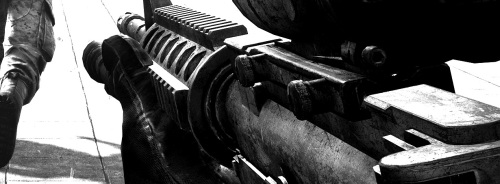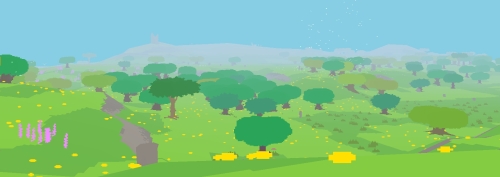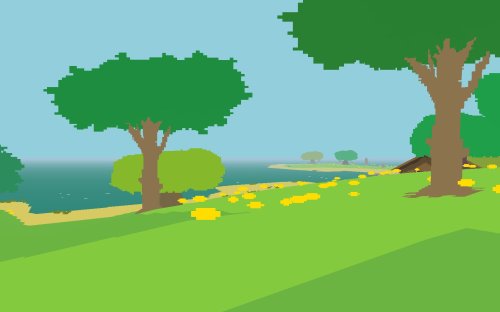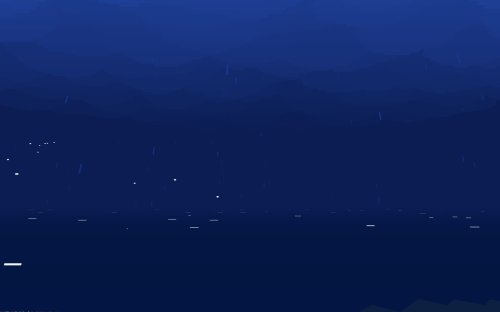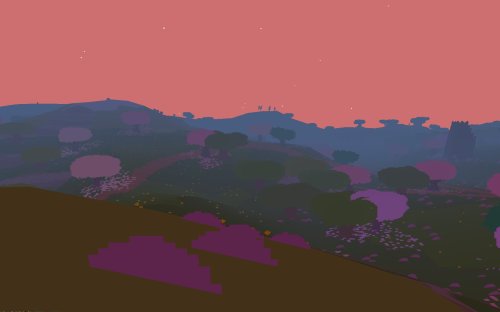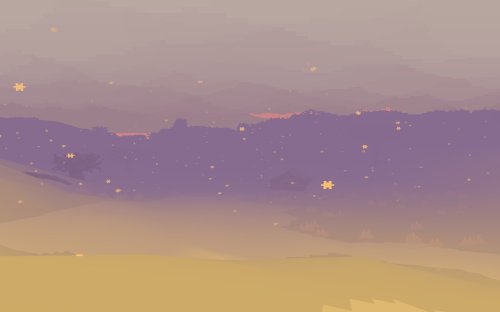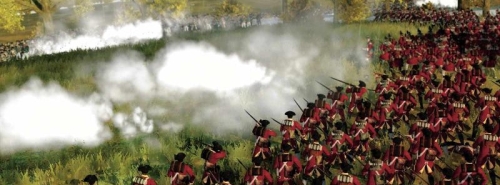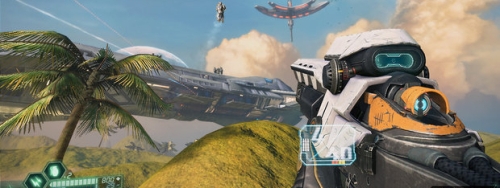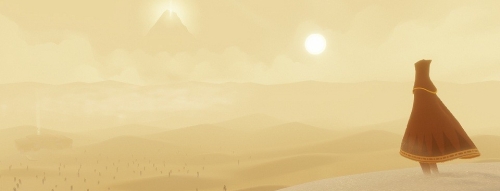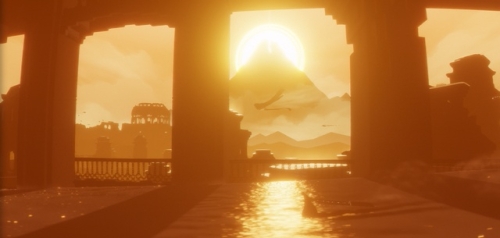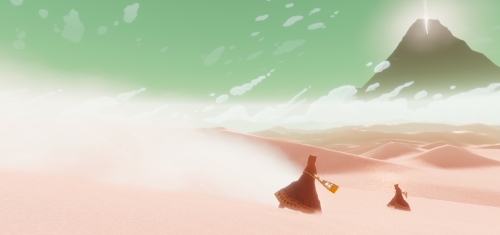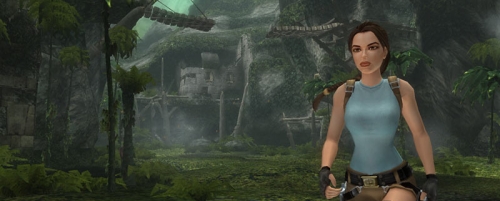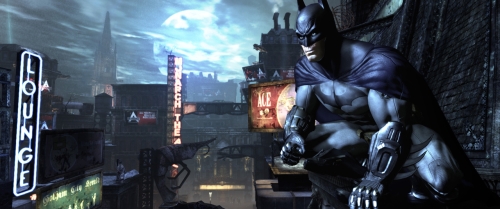Just a quick note if anyone stumbles across this blog, if any virtual eyes are still trained this way, that I now post across at The Scouring of Saucepans. The remit is wider, films and politics and esoteric Eastern religion and even some haltering attempts towards fiction, but maybe there’ll be something about good old vidjagames somewhere down the line. Never say never, eh? Anyway, if anyone cares, that’s where you can find me. Peace and cuddles.
Proteus: The Great Chorus
He fades out on the ride home. It is later than he thought and the bus is crowded, but he is alone. His mind drifts from the dirty jokes of the boys opposite, from the immobilising sweetness of a girl’s perfume, from the condensation on the windows, and the wet streets repeating behind them, and comes to rest in the emptiness of the sky.
There is the sensation of rolling, a gentle, undulating motion, but nothing more. Time passes. He snaps back into consciousness, and finds his jaw is going.
At home he closes his curtains, turns on his computer. The whir as the machine readies itself unnerves him; he sees images of gears and cogs, arcane machinery receding into dark depths. He feels pulled down into the hallucination; the picture morphs, melts; suddenly he is travelling through the pathways of his own brain, an electrical current sparking along synapses, burning them up as it passes, coiled hairs crackling over a bonfire in the night.
He shakes his head. He should try to sleep soon, though he knows it is not time yet. Now is that hard stretch of time when existence has a physical form, when its dimensions can be felt, its choking weight, stretching dull and blank into an interminable future. There is too much existence.
He decides to play a videogame. He has not been playing games recently — their guns, their machismo, their endless, hollow grind, has begun to feel inane to him — but now, drained yet awake, his mind floating back from a distant place, he has a need to play.
What he plays is a game called Proteus. It is a short game about music and exploration, a cool breeze, a digital world he knows will envelop him — and he needs to be enveloped, before the voice that is beginning to rise back behind his thoughts, the cold voice he had heard so stark and fundamental last night, has a chance to take hold.
He clicks the icon for Proteus. He goes in.
—
He awakes in water. An island stretches from the mist before him. It is pixelated, pastoral. He wades to the shore, hearing only the sound of the water. It is a clear, pure sound, majestic in its totality.
On land a song begins to build in his ears. Everything in this world has its own tune — the trees, the clouds, the Earth itself. He stands and lets the island’s chorus wash over him.
He makes his way inland. Up from the shore he finds a small creature resting amongst the flowers. Startled by his approaching figure, the creature springs away into the undergrowth: Bip, bop, boop.
He stops by a tree. Blossom falls to the ground. He finds it is almost sensuous, how the blossom falls, how delicately it lands upon the grass. It has that way about it, he thinks, the acceptance, the loss of resistance.
He continues on. There are no people on the island, no objectives. Only an ever-changing symphony of meadows, flowers, rocks, sea and sky.
He finds a path and follows it. The path leads him up a mountain. He stands at the summit and watches cloud banks roll in beneath him. The clouds nestle into the contours of the land, blanketing the world in a soft-hued fog. Peaks jut from the clouds in the distance. The wind whistles about him.
The sun begins to set. Light retreats from the world, leaving the sky cool and dark and alone. Stars come out. The moon rises.
He walks to a cliff top above a little cove and follows it round, watching the moonlight on the waves below. He descends through dense woods, feeling solitary yet protected. Eventually the woods open out onto a beach, quiet in the night air. There are rain clouds. The rain falls across the ocean. He listens to the raindrops as they patter into the sea.
The sky clears. He stands under a canopy of leaves, branches groaning in the dark, waves lapping the shore. He looks out, far away, over the horizon. There is a peace to the land. The softness of the night carries him away, draws his thoughts back to a night very different to this one. To last night …
He remembers the anxiety in the club, waiting to come up. How the faux leather seats in the booth had been sticky, how they had smelt of beer. He remembers looking at the faces of the people he was with, faces he knew but did not know, and feeling that they were on the other side of a great chasm, a silent expanse he could not cross.
The dance floor had been filled with beautiful people. He had looked at them and wondered where they came from, what force propelled them, how they could glide through life so effortlessly, the thing that held him down passing over them unnoticed.
On the edge of the dance floor a girl had spoken and he had turned around, but the girl had not been speaking to him, and he had felt a chill, and he had known then that he was not going to get high.
But then later, at the bar, after the first rush had taken him, he had felt like liquid, felt smooth, like he was washing away, and he had decided it would be OK. The bartender had had one iris darker than the other and he had joked with him, how the gin was the bad gin not the good gin, and he had said next time a water, his jaw going a little, and the bartender had smiled because he knew, and everything had been fine, had smudged nicely.
But a few minutes later the wave had already broken, and he had found himself in a cubicle, his back to the door, listening for bouncers, reaching for his key. He had looked down and seen the urine on the floor, had felt the cold you often feel in toilets, and he had realised that all barriers had been destroyed.
He had been naked, alone, alert to the truth, to the realisation he could not escape from. He always felt it, usually dull, hidden just out of sight, but now it was right before him. A kind of dread, a loathing of life. Nothing was enough. All would die; all would cease to be.
In his altered state the everyday aspects of his personality had been stripped from him, and all that was left was the singular truth: he had no home in reality. Life was cold, chaotic, and utterly repugnant in its ordinariness, its blatant mundanity.
So he had done then what he always did, which was to run. He had drowned the realisation in alcohol, burned it with chemicals, trying to obliterate it, and everything else along with it. He had forced himself into the rush, charging headlong down a corridor between the stars. Smoke and lasers and twisting nothing, thrashing nothing. Faster. Coming, arriving, dancing. Lost. A bassline, a light shining through his beer bottle, a moment of tranquillity, of silence — then faster, powder, keys, drink; faster and faster, arriving, arriving; I do not know where I belong; arriving, faster, faster; I am lost; I am lost.
And then just blackness.
—
In Proteus, the first light climbs lazily from its slumber behind the world, and a new day begins.
He sets off to roam the valleys of spring. Wind buffets the trees. Insects chirp in the bush. A ring of trumpet-like flowers sway and honk in the dawn. When he gets close the flowers yelp and dart back into the ground.
He walks on and on.
Seasons whirl. Summer arrives. Toadstools grow in the valleys, bees hum beneath the trees. The air is thick with the chatter of life, voluminous and swollen. The sun blazes down. He looks up and feels the sun’s embrace, feels how it is boundless, yet indifferent also.
The sky turns coral, then magenta, then amethyst. An owl glides through the night, settling noiselessly in a distant tree. A shooting star streaks across the firmament above, aflame for one precious moment, then is gone.
Autumn is sombre, reposeful. The oranges and reds deepen. He watches a single tree for many minutes, its branches a silhouette against the sky, its leaves falling with an elegiac beauty. The tree’s lament, the waiting ground, the mournful arc of the moon overhead, swells something within him, and tears come to his eyes.
He heads down to the ocean once more. Always he is drawn to the sea. As he stands there a silence builds in his ears. It is not a silence of the world, but rather behind the world. It is a silence, he realises, within himself.
Then comes the hard, crystalline charm of winter. Snow draws the world in, mutes its sounds. Everything is close, celestial, sacred. He walks across the transformed land and out onto the frozen sea, and snowflakes fall from the heavens.
The snowflakes fall and fall. They fall past his eyes, through his body; they touch nothing; they fall forever. He walks into the snowflakes and he listens to the music emanating from all manifested things — and to the silence behind them, the silence from which the notes are born.
The notes and the silence. They go together, he sees. The music is not just the notes, but the silence also. Two sides forming with their union a great and impenetrable song — a song of cycles, of death and rebirth, of flux. It is a song of awareness. A song of return.
And a voice within himself begins to harmonise. It is the same voice from last night, though it is no longer twisted in fear, unable to face reality. It is his own voice. And now it is singing with the voices all about it, another refrain in the multitudinous ballad that is nonetheless composed around a singular theme. The music forms into words.
Wake up, the world sings. Wake up.
The snowflakes fall. He walks through them, and upwards, into the emptiness of the sky.
Filed under Game Ponderings, Ramblings
A Gaming Education: Empire: Total War
The young soldier stands before the older man’s tent. His face is flecked with dirt, his clothes stained, ragged. His figure is that of a boy, but his eyes are weary beyond their years. Though fatigued, on the point on collapse, he manages to snap off a salute worthy of the parade ground to his commanding officer.
The older man smiles to him brightly.
“Yes, sonny?”
“General, I return from Fort Niagara. Our regiment was … decimated. The enemy’s numbers are far greater than you anticipated.”
“I see.”
“I rode night and day to bring you this news. An army is being amassed against us. They can be no more than a few hours march from this position.”
The older man sits in thought, the freshly polished buttons on his tunic glinting in the morning sun.
“Well,” he says after some time, “do you think we should try that diplomacy thing?”
“Sir?”
“You know, I could offer them, what was it? … Oh yes, access to our military?”
“I’m not sure that would be wise, sir.”
“Right, right, of course not. A state gift, then?”
“It may be a little late for–”
But even as the young soldier speaks, a cry is heard across camp. A scout runs to the older man’s side, salutes.
“Enemy forces have been spotted in the woodlands to our East, sir. And cavalry are advancing upon our Western flank. What are your orders?”
The older man scratches his beard. “Right, okay. I’ve got this. Lieutenant, take these men. No, sorry, I meant the men with the muskets. Where are the men with the muskets? Ah, yes, here they are. So take them, and — are you listening carefully? — turn them sideways. No, not that sideways. The other sideways. Starboard. Oh, that’s ships, isn’t it? Ere the rising of the sun. As the crow flies. Yes, that’s it.
“Now, take these guys — who are these guys? Doesn’t matter. Take them and stand them next to the musket men. Sort of next to, but also sort of in the middle of. Perfect.
“Right, now let’s get our cavalry and place them behind this building and forget about them for the rest of the battle. And tell those men … I don’t know what to tell those men. Tell them to hold steady. And to about-face. And present arms. And present legs.
“You know, actually, scrap all that. Get everyone here. Yeah, everyone. Gather round, chaps. Okay, new plan. I want you all to go kill that man in the red hat. His hat is stupid. And I want it. Kill that man and bring me his hat. And when you’re done, pick another man, and kill him. Rinse, repeat. Bish, bash, bosh. Battle will be over in no time. Then back home to raise and lower taxes randomly, build half a fishery and declare war on ourselves. Go Team … Who are we again? Whatever. Go us!”
As the troops begin moving out, the young soldier looks back at his commanding officer.
“Well, general, I suppose this is goodbye.”
The older man looks down at the boy. “You know, I have no idea why you all keep calling me that. I run a cake shop in Aberystwyth.”
“Still, sir,” says the young soldier. “You command, and we obey.”
“How odd. Anyway, looks like you’d better be off. Don’t want you to get left behind. See you later, maybe.”
“Yes, sir. Maybe.”
And the young soldier marches away. The older man sits by his tent, wondering vaguely when they’ll let him play with some ships, but mostly just dreaming of cake.
Filed under Game Ponderings
Ascension
My friend Alex is trying to get me to buy Diablo III. He’s been trying to get me to buy Diablo III every moment that has passed since it was released.
“Have you bought it yet?”
“Nope.”
“How about now?”
“Still no.”
“You never buy it. Just buy it!”
It’s June, and the world is going mad for Diablo III. The latest magnum opus from Blizzard, creators of World of Warcraft (Blizzard get more than one magnum opus), Diablo III is hot news. Twitter is awash with games journalists discussing it. My friend Steve is up to Inferno difficulty already. Quintin Smith has written a great piece on Eurogamer about why the game only truly comes alive on Hardcore mode, where you get one life, and if you die you have to start again from the beginning. Quintin Smith is the definition of “hardcore”.
I want to be a games journalist, but worry I haven’t played enough games. I need to get involved in this, the gaming event of the year.
Problem is, Diablo III retails for £44.99. My part-time bar job secures me roughly £500 a month, £370 of which goes straight on rent. After food, drink, travel, and phone contract, there’s very little left over for videogames — even magna opera from the creators of World of Warcraft.
So when my friend Alex tries to get me to buy Diablo III, I simply sigh, and change the subject. I don’t buy Diablo III. This is not the story of Diablo III.
***
“What the hell are we going to play then?”
I’m sat in my room. It’s an uncharacteristically sunny day, and prismatic rays of light are filtering through my blinds. I shield my monitor with my hand, the better to see my instant messenger conversation with Alex.
“You pick,” I say.
No beat. “Age of Empires II.”
Age of Empires II was Alex’s favourite game as a kid. At university, he used to quote barks from the people in the game every opportunity he got. “Gold, please,” he’d say if he wanted to borrow money. If he won at something: “It’s good to be king.” That was just one of his things.
He doesn’t do that any more, though. Neither of us owns Age of Empires II anyway — Alex lost his copy; I never owned it, because I want to be a games journalist but I haven’t played enough games. It’s just another old joke, a way of reminding ourselves of happier times.
Alex doesn’t have a job. He was doing this soulless HR thing at a soulless bank, but then the company cut the role because they’d spent too much money on cocaine and hookers for their executives. They told him if he wanted to stay with them he had to go on the phones in one of their soulless call centres. So he walked out. He’s my hero because of that, but I also appreciate it’s made him pretty unhappy.
I still have my job, at the soulless pub, so I’m unhappy for different reasons. And I’m unhappy because I want to be a games journalist, but I haven’t played enough games, and I don’t write enough about the ones I have played. The months of languor are turning into years, and my ambitions are dissolving like ethereal dreams, fractured by the morning light.
We’re stuck waiting for something to happen, never moving forwards, never doing anything new.
“Fuck it,” I say. “Let’s play Tribes: Ascend.”
***
Tribes: Ascend is a new game. It’s research. A multiplayer shooter about fluidity of movement and precision attacks, Rich Stanton gave it 10/10 in his review on Eurogamer, and Rab Florence has been calling it one of the best games on PC. Sweetest of all, though, it’s free-to-play. Even I can afford free-to-play.
We click the launchers on our respective desktops. My launcher tells me it needs to update the client before I can play. Alex says a swearword over Skype. I guess his has told him the same.
We wait.
“How many megabytes has yours downloaded?”
“78. You?”
“Hah. 93.”
The client updates, then the new client says it needs to download the latest patch files to bring the game up to date. We both say swearwords over Skype.
Alex asks how many megabytes mine has downloaded. I lie and say a high number. Alex says a number higher than that. I think he’s lying. The Skype call loses quality because of the strain on the connection, and our voices take on a metallic, robotic sound.
“I need your clothes, your boots and your motorcycle,” Alex says.
“I know now why you cry, but it is something I can never do.”
“What?”
“The lava bit, dude. Learn your history.”
We try to play megabytes-downloaded top trumps again, but so many files have downloaded we’re not sure we’re on the same one. So we play file-version top trumps instead. Alex’s file version is like 1.0.14.0.85.6. Mine is like 1.0.1145.08.9. We’re not sure which is better.
After another sixteen hours of this, the downloads whirr to a halt, and the “Play” button glows orange. We’re in.
***
I called Tribes: Ascend a multiplayer shooter before, but it could just as truthfully be called a multiplayer mover. It places as much emphasis on traversing the terrain as it does on fragging players. The stompy robots (or men in robot armour, I’m never sure) that you control are painfully slow on foot. But holding the spacebar allows you to begin sliding frictionlessly, or “skiing”, along the ground. You build momentum down hills, and maintain it on flats. Then hitting the right-mouse-button engages your jetpack, boosting you into the air, keeping up your speed.
The game therefore becomes a test of your ability to ride the landscape, carving lines into and out of the pockmarked arenas, skiing down hills, boosting over lips, arcing your descent back into the downward curve of a slope, faster and faster, like some kind of robotic ballerina.
And you share the stage with 31 other dancers. And half of them need to die. The weapons you carry are mostly of the grenade and rocket varieties, meaning they have their own arcing trajectories, and explode on timers or upon impact. Getting a kill generally involves watching the line an enemy is taking, at hundreds of km/h, then firing off a rocket ahead of them to intersect with their line. All the while dodging and leaping and feinting to avoid their projectiles.
That’s the plan, anyway. Our first match doesn’t end up like that.
We’re both playing Pathfinders — the fastest, but also most lightly armoured, class — and the bigger boys keep swatting us away like gnats.
We’re not building any momentum. We’re getting stuck in craters, trudging up slopes then being blown apart before we reach the top. We’re using our jetpacks in the wrong places, draining energy so it’s not there when we need it. I keep checking the scoreboard, increasingly despondent at our dire performance.
One red player in particular is going to town on us. An enormous Doombringer, with a chain cannon spitting death at thousands of rounds a minute, he’s standing tall in the centre of the map, blasting us apart again and again. He looks like he’s bought the best equipment via microtransactions.
“That guy is a prick,” Alex says.
“Yeah, I hate that prick.”
“LOLLL n00bs,” he types to us over in-game chat, after squashing us both for the tenth time.
The game finishes with Alex third from bottom on the scoreboard, and me second from bottom. The guy in last place only logged on a few minutes ago. Over on the red team, Doombringer Prick is top of the server.
The next games go no better. If anything, we get worse. The afternoon wears on. My room begins to get gloomy. I’ve got work again tomorrow.
Alex sighs. “Videogames are shit.”
I don’t say anything.
We’re on the post-match analysis page, a purgatorial screen awash with statistics breaking down exactly how abysmally we just performed. It’s clear we’re not playing our class properly. Pathfinders should be about mobility, nipping in and out of fights, chasing down targets, staying clear of head-on battles. We know that. But we’re not doing it.
“What was your top speed?” Alex asks.
But I don’t feel like playing top trumps. It’s one of our old things, and not funny any more. We used to have lots of things, silly little in-jokes that were great precisely because they were so dumb. But we never come up with new ones these days. We just rehash the old ones again and again, wringing the last vestiges of colour from them until they’re dead and grey.
***
Recently I wrote an essay about a game I liked, and it got republished on a big website, and a lot of people said really nice things about it. The essay was full of zen-like insights into the nature of reality, about how to find inner peace, how this game had taught me to be a better person.
But it was all lies. I know nothing of inner peace. In truth I’ve been utterly depressed since writing that essay, certain that I’ll never write anything good again, that all these people now following my work are going to be disappointed when they realise I’ve tricked them, that I have nothing worthwhile to say.
All the old jokes Alex and I keep telling, the top trumps, the way we always suggest Age of Empires II to play together, we do it for one reason: to avoid facing the truth.
So I decide to face the truth.
I’m 27. Half a decade or so older than most starting games journalists. For years I’ve been putting weird stories about games up on my blog, because I’m scared of the rejection of trying to get them published. I’m unhappy. I’ve probably not got what it takes to make it as a freelancer. I’ve got no idea what’s going to happen to me in the future. And I suck at Tribes: Ascend.
I face all that. I don’t do what I usually do, which is wish it wasn’t true. I just allow it to be. Stare directly into the eyes of the beast. It takes a lot of effort.
But simultaneously it removes a burden. Fuck it. There’s no point arguing with what has already happened. That just keeps you shackled to the past, repeating the same mistakes.
“Let’s play again,” I say.
***
It’s the Sulfur Cove level, with the spaceship hovering above the battlefield. I start skiing. Not even trying to get kills, Just enjoying the freedom of movement. I go up and down, up and down. Faster and faster. I see the lip coming towards me, and engage my jetpack, and then I’m launching into the stratosphere, gliding down gracefully onto the deck of the spaceship. I can see the whole level splayed out below me.
“Coo-ee.”
Alex looks up. “You bad boy. How did you get up there?”
He abandons his doomed firefight and starts skiing round, trying to build the speed to reach me. He keeps almost making it, but not having the momentum, and falling short. One attempt he’s inches from the barrel of my gun, close enough to touch, then he drops comically, Wile E. Coyote style, back to earth. He’s laughing. We’re both laughing.
And that’s when I realise the thing that has been strangling me for so long, the dark veil draped over everything, separating me from everyone, has gone. That’s when I realise I’m free.
The rest of the match, we dick around. A guy on the red team is called BernieTheBusMan, and we follow him like fanboys, cheering each time he kills us. When Doombringer Prick interrupts our fun with his chain cannon, we boo him.
“What do you reckon he looks like in real life?”
“I don’t know, but to be fair you’ve got to give it to him, being able to kill us both with one hand permanently stuffed in his mega-bag of Cheesy Wotsits.”
“And the other fondling his balls.”
***
Next match, I invent a new thing.
I’m skiing super fast, hoping to beat Alex come the post-match top speed analysis, and my momentum plows me into a hornets’ nest of enemies. Red icons everywhere, maybe fifteen in total, all swarming and buzzing, out for that fatal sting.
“Uh oh,” Alex says, spotting me from his safe perch.
But I feel strange. Like Neo facing down Agent Smith at the end of The Matrix. I’m not going to run any more.
I stop thinking. All becomes fluid. I leap, land, leap again. Rocket towards three of them. Twist. Leap. Rocket, rocket. Switch to shotgun, finish one, back to rocket. Leap. Rocket. Dodge. Rocket. Rocket.
I shotgun one between the eyes, and land. I reload, scan my surroundings. I’m alone.
“Haha. Bobby-the-Berserker,” Alex says.
“Yeah, well, fuck em. Fuck em where they live.”
And there it is. Fuck em where they live. It becomes our new thing. Alex tries to say it later, but gets it wrong, and says, “Fuck them at home.” So then our new thing becomes being street in the most middle-class way possible. “Fuck them at their nan’s house,” we’re saying before long.
That same match we get revenge on Doombringer Prick. He’s got loads of armour, but he’s slow, and can’t jump far. He doesn’t intimidate us any more.
I zip past him and unload my shotgun. Alex places a nice rocket at his feet. We boost way up, away from his danger zone, and Alex angles another cheeky rocket in. I’m past the zenith of my jump, coming down fast. I grasp my shotgun as I plummet towards him.
KA-THUNK. Both barrels to the face. I sweep right through him. The speed is exhilarating. He’s blasted out of the game, probably right off the internet. Somewhere, in some darkened basement room, a man has just spilt Monster energy drink all down himself.
“Cheesy Wotsits everywhere,” Alex remarks.
***
It gets late. We decide to call it a night. We log out of the game, but stay idling on Skype, as is our wont.
“Videogames are cool,” Alex says.
“Yeah, sometimes they are.”
“You haven’t written anything on your blog for a while, have you?”
“No.” I pause, swallow. “I’ve been thinking … I might take a break from it all. Just for a bit. It’s sort of ruining my life. I think I put too much pressure on myself.”
“Yeah, badly!” Alex says, as if he’s been waiting for me to admit that for a long time. “We all like what you write, but that’s not why we like you. Just chill for a bit, go easy on yourself. Then if it’s meant to come, it’ll come.”
And he’s right. If it’s meant to come, it’ll come. Uphill struggles will only wear you out. Just like in Tribes, the best you can do is learn to ride the terrain. Find an easy route, build some momentum, then you can start to tackle the harder slopes. And before you know it you’ll be soaring into that sliver of timeless time, the eternal now, where everything is open, and glorious, and you laugh for the sheer joy of it.
***
A month passes. Once again I find myself on Skype with Alex, just idling, as is our wont. I tell him I’m thinking about writing a little something about our time with Tribes: Ascend. Something short and breezy.
“Do it,” Alex says. “Just make sure you talk a lot about when I was top of the server.”
“Of course.”
“And don’t exaggerate about the time you fucked those three reds where they lived.”
“Wouldn’t dream of it.”
“Good,” Alex says. “Now, let’s get back to Diablo III.”
Because I’ve found the money. You always do, when it matters. The money wasn’t the problem, anyway; it was my fear of moving forwards.
Alex logs into the game. And I follow him, into a future filled with uncertainty and strife. For the first time in ages, I feel ready to confront it.
Filed under Game Ponderings, Ramblings
Over the Precipice: An Essay on Journey
There’s this speech that always chokes me up, given to a graduating class at Kenyon College in America, by the writer David Foster Wallace. It’s a beautiful speech, infused with a kind of honest optimism that is less hope for the world to be a certain way, and more determination to see the world as it truly is, to see the terror and splendour that shines forth from every small moment of existence — every lonely evening at the supermarket, every petty encounter with motorists on the drive home from work.
That Wallace, three years after the speech was given, succumbed to the demons of depression he had battled his whole adult life, killing himself in 2008, in no way invalidates his message. Rather, it charges it with even more urgency, even more pathos. There are dark times ahead for all of us, he seems to say — work hard to love and to feel, while you still can.
Anyway, Wallace opened his speech with a joke about fish, and it’s this joke I’d like pilfer now, respectfully, as an opening for this essay.
There are these two young fish, so the joke goes, just swimming along, slacking off. They see an older fish in the distance, swimming towards them from the opposite direction. As the older fish passes, he waves his fin at the youngsters and says, “Morning, boys, how’s the water?” The two young fish swim on a way, in silence, then finally one turns to the other and says, “What the hell is ‘water’?”
Now, that is a philosophical joke, which means partly that it’s not funny, but also that its profundity is revealed gradually, the deeper you consider it. The point is that, while it is easy for us to see water for what it is — as outsiders looking in — for the fish it is always there, and thus very hard to be aware of.
This is a message worth keeping in mind when thinking about Journey, the latest release from Thatgamecompany, developers of the zen-like Cloud, Flow and Flower. Journey is a remarkable videogame, a work of art that commentators across the spectrum of gaming have found much to ponder within.
For me, Journey is about the only thing that art worth any goddamn can ever be about, which is what it is we’re all doing here. Journey is about truth, about base reality, about this experience of being itself we so often ignore. It is a call to look around us and remember that, as David Foster Wallace puts it: “This is water. This is water.”
We humans like to think we’re pretty hot shit. We stand, like the figure in that screenshot up there, overlooking our kingdoms, lords of all we survey. We are intellectual beings, gods on Earth; we have split the atom, put man on the moon, invented squeezable jam. We have mastered chaos.
And yet we trudge onwards under a shadow. There is a great shape towering over us, and it is brought closer with every step. We are on a fixed path, ushered forwards, and there can be no escape. We stand upon a precipice, waiting for the moment we will be tipped off. And then … Who knows? For all our nuclear reactors and space shuttles and tubed-jams, we have no clue what will happen when we take the final fall. Our arrogance is really a mask for fear, for the truth of our situation, which is that we are but insignificant flames, blazing once in an endless void, soon to be extinguished forever.
There is, certainly, a sense of this evident within Journey. Its tale of an enigmatic robed figure travelling through a vast desert towards a distant mountain can be read as a treatise on death, a declaration of the inconsequentiality of man’s power and knowledge when measured against the vastness of the cosmos. We are tiny specks scuttling across a universe that feels nothing but cold indifference to our plight. We are alone, and we will all die.
The thing is, while Journey might present us with these facts, the conclusions it arrives at are far from nihilistic. In the vigour and exuberance engendered through traversing its undulating sands, you feel not despair at your insignificance, but liberation. The treatise on death is transformed into a treatise on life. And not life as opposed to death, but life including death.
Because the real truth of our situation is not that we are standing on a precipice, waiting to fall, but that we are falling already, and haven’t yet hit the ground. Rather than peering down into a dark unknown, we are actually in this dark unknown right now. The dark unknown is, at our most fundamental level, us.
It hardly matters that we don’t know what will happen when we die, because we don’t even know what will happen when we live. We don’t even know what we mean when we say “know”.
“The Tao that can be spoken of is not the eternal Tao.
The name that can be named is not the eternal name.”
These wry, wise old words come from the first lines of the Tao Te Ching, a screed regarding the Tao, or hidden flow, of the universe. It’s telling that the lines, among the most penetrating — and most quoted — in philosophical discourse, comprise a negative statement — telling us what is not, rather than what is. In much of Taoist (and subsequent Zen) thought, the assumption is that awareness of base reality — and thus liberation, enlightenment — is not something that can be intellectually arrived at, but a fundamental truth of existence that we simply have to stop trying to attain, and remember is here, right now, for us all to experience.
We don’t often think like this in the West. Our busy, fearful, left-hemisphere dominated minds have a hard time relinquishing control and placing faith in a more natural, less forced intelligence. A Zen master would remind us that a finger pointing to the moon is not the moon, while our great thinkers tie themselves in knots wanting written instructions how to look from the finger to the moon, how eyes switch targets, how light is converted into electro-chemical impulses, and how that happens, and how that happens.
We believe it is possible to “know” everything, and we do so erroneously. For what we mean by “knowing” is really just grouping, ordering, filing away. To know a thing is to delineate it, to demarcate its boundaries, its opposites, to cut it away from the rest of the world so it may be observed. In doing so we build complex maps of the relationships between things, yet we say nothing of the things themselves. You cannot demarcate that which has no opposite. To try is to confuse the map with the territory.
I still remember this faux intellectual punk I used to know, who once sneered, “Everyone gets so soppy about love, without realising it’s just a chemical reaction in the brain that means nothing.” The kid thought that because he could classify love, he could explain it away! He didn’t recognise that the whole universe is a chemical reaction — if viewed through the framework of chemistry. Love, or fear, anxiety, joy, are what chemistry feels like from the inside. We are a chemical reaction experiencing itself! To borrow again from the Tao Te Ching, “Mystery of mysteries, the door to all wonders.”
This isn’t, however, to say that the Western mind is worse at perceiving truth than the Eastern mind. For where our intellectual discourse fails, our art provides answers. Art is a way of presenting truth as honestly as possible, a kind of meditation — both in the creation and the contemplation — that allows us to see deeply into things as they really are. Whether staring at a lapis lazuli pendant from ancient Mesopotamia, vibrant with preternatural colour, or feeling a creeping dread at the hellish rabbit visions conjured onto film by David Lynch, or exploring the simulated realms of a modern videogame, art lets us step back and refocus on what is, reminds us of the incomprehensibility of this teeming mass of reality blossoming each moment around us, and within us.
And when we do so we are transformed. We no longer bustle along the forest path, eyes down, heads busy with What Jason Said Yesterday, or Why Sarah is Such a Cow — but instead look up, and remember that we are, at this very moment, in paradise, and we better appreciate it now, before it is gone for good.
This is what Journey does for me. It is, I think, an antidote to the suffering we feel when we misjudge our place on Earth. Sometimes we trudge up dunes, and the going is tough. Sometimes we surf and sail downhill, and we feel borne on the wind. Such is life.
There is a mountain towering over us, the engulfing light at its peak drawing closer with each step. But this mountain need not be a spectre. It can instead be a warden — a lighthouse guiding us home, waiting patiently for our return. We soar up its slopes, our hearts glad. We are tiny, we are empty, we know nothing — and how very beautiful that ultimate truth is. For when we are empty of ourselves we can let everything else in, and it is then when we find our real selves, not apart from the universe, but a part of it, growing out of it, growing back into it.
And we are far from alone. Look at all these other travellers around us, pilgrims on the same journey. When we meet others in Journey, we no longer care about measuring them, comparing them, judging them. We don’t wish to manipulate them, nor do we fear being manipulated by them. We see them for who they truly are, empty as well, and we can enjoy simply existing with them, being with them, as we once did as children in that half-forgotten world of dreams we used to inhabit.
There we stand, together, on the precipice of all things — two tiny hearts beating in unison against the drone of an endless cosmos. What is there to do but sing? So we sing.
And, somewhere down there, over the precipice of all things, the endless cosmos sings back.
Filed under Game Ponderings, Ramblings
A Gaming Education: Tomb Raider: Anniversary
Come close, let me tell you a secret. No, not the one about what I did with the carrot and the hand cream. Or the one about what I did with the toothbrush and the hand cream. Or the one about what I did with the fully-poseable Incredible Hulk action-figure and the hand cream. How do you know so much about my undergraduate Chemistry thesis exploring the effects of hand cream on household objects anyway?
This secret is darker, more shameful, than such nonsense. Before last week, I had never played a Tomb Raider game. GASP and/or SHOCK, with appropriate measures of HORROR. I know.
Actually, there’s two caveats to this: in 1996 I did watch my neighbour play the first game for half an hour or so — hazy memories of underground pits and Lara Croft being eaten by wolves; then a few years ago I beat a boss-fight my friend was stuck on in a Tomb Raider she had for her Wii. Apart from those toe-dips though, nothing.
I should have dived in earlier. If Tomb Raider: Anniversary, a Crystal-Dynamics-developed reimagining of the original adventure, is anything to go by, tomb raiding is a blast. Slow, thoughtful puzzling is the order of the day here, with that ungainly “combat” malarkey relegated to brief staccatos of action that enliven play without *cough Uncharted* bogging down the *cough Uncharted* flow. See how I bogged down the flow of that sentence by referencing a game whose primary failing was its reliance on repetitive combat that bogged down its flow? That’s what they pay me the big bucks for.
Tomb Raider: Anniversary, then, mostly has the self-assurance to present you with its buried temples and lost cities, then sit back and let you scuttle all over them at your leisure. If Uncharted is the young seductress, sleek and sexy and eager to please, Tomb Raider is the middle-aged divorcee down the street, well aware of her talents, lying there patiently as you build the confidence to … ransack her catacombs. Then, just when you think you’ve got it figured out, you have to fight a T-Rex. Ain’t that always the way?
The drawback to this veteran’s approach, however, is a move-set that feels clunky and counter-intuitive when contrasted with the context-sensitive fluidity of today’s videogame sirens. We’ve moved away from games designed with pre-determined, inflexible animations that layer over level geometry; watching Lara have to jump to her full height, with arms outstretched, before she can grab the ledge just above her on her descent is antiquated and laughable.
Lara’s famous bouncy bazoombas look silly these days as well, though to be fair to the old gal there is something iconic about her appearance. She’s more archetype than stereotype, really, and she doesn’t make me cringe with embarrassment as so many female games protagonists do. Perhaps because she stays mercifully silent during much of the game. (Oh Christ. Not that I’m implying my idea of a good woman is one who shuts the hell up. No. She should also be good at cooking, and … like … tapestry, and … long multiplication, and getting DVDs off those central rings in their cases, and stuff. Banter LOL.)
I like Tomb Raider: Anniversary. I like how lonely and even wistful it often is. Put it down to the age of the underlying template, but it reminds me of the emptiness videogames embodied when they first made the transition to three dimensions. There were no crowd scenes back then, no waves of voice-acted enemies or chatty cohorts. Your experience came down to wandering wondrous yet abandoned worlds, solving puzzles left by — whom? –, marvelling at the bittersweet, yugen-like emotions these solitary adventures conjured within you.
Yes, Indiana Jones rip-off starring big-titted bimbo as Zen satori instigator. I really can do that with anything. It’s a talent.
Filed under Game Ponderings
A Gaming Education: Batman: Arkham City
I’ve noticed videogame articles containing bullet points are a lot more likely to get commissioned on big sites these days, perhaps because the editors of places like GamesRadar recognise that the repetition of stark black holes boring through the fabric of reality draws the attention of readers towards the inescapable futility of our existence, reminds us that nothingness rests at the base of our experience, and that, far from fearing it, we should embrace this Taoistic interpretation of zero as the root of our creativity and love.
As such, I’m going to adopt the approach for this Gaming Education about Batman: Arkham City, and maybe GamesRadar will pay me the £15 and loss of all journalistic dignity that they bestow upon their other writers. Huzzah!
Here are some memento moris explaining why Arkham City is a game to keep you playing through many a Dark Knight. Which is a pun, which Gamesradar will enjoy, perhaps because they’re cunts. To the bullet-point cave! (that one wasn’t as good):
- Batman: Arkham City provides a searing and heartfelt glimpse into the life of an average goon. They don’t have it easy, those goons. For they must stand on very dirty street corners, warming their hands against tragically clichéd trash-can fires, muttering the same string of oddly informative explanations of the evil plans of their super-criminal masters. And then, just when they’re tiring of the exposition, and wondering if they could maybe start talking about something useful, like where to find a good greengrocer’s in a city that is literally a prison, some caped bastard swoops down from the shadows and uppercuts them in the goolies. The poor lambs.
- Arkham City is loved by girls, such as my friend Grace. She says she likes “flying around the city and whatnot” — which is endearing, because as every comic book geek knows, Batman doesn’t actually possess the power of flight, but rather employs squadrons of tiny RC helicopters hidden in his boots to give him the illusion of flight. Girls, huh? Trying to muscle in on our hobbies but always getting it wrong. Though maybe I’m just cross because Grace completed the game and I keep getting killed by goons while searching for the remote for my helicopter-boots.
- Most importantly, Arkham City is a good game because it lets you punch people really hard in the face. Punching people in the face is what videogames are for. You always want to punch people in the face in real life, but you’re not allowed. Like the time in a maths lesson when the teacher hadn’t turned up yet and Josh McMuscles (I changed his name) got me in a headlock because his parents hadn’t bought him a car yet, and my cheeks turned beetroot, and my spots became even more visible than usual, and all the girls stared at me with this mixture of pity and revulsion, which is a look I’ve become so familiar with in the years since. If that maths lesson had been set inside Arkham City, I could have punched Josh right in his stupid, classically-attractive face, maybe breaking a couple of those perfect teeth, before grappling up to a gargoyle on the ceiling and brooding darkly as I watched as pandemonium ensued below. That wasn’t the best way to end that sentence, but try saying “pandemonium” without saying “ensued” right afterwards. An impossibility.
Well, then. If GamesRadar has taught me anything (it hasn’t), it’s that videogame articles shouldn’t outstay their welcome. The audience-surveys conducted by GamesRadar suggest readers tire of bullet points after the third bullet point, returning to their usual pursuits of homophobia and banging their heads repeatedly against walls, trees, sparrows and babies’ prams, looking to comprehend the world through the only method of interaction they understand. So on that note, I’m outtie. Fingers crossed for the call-up from GamesRadar, eh?
Filed under Game Ponderings

